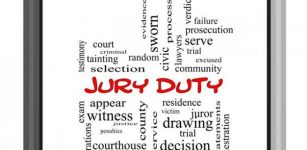Trial by Media in the Internet Age

The growth of the internet generally, and social media in particular, has led two senior legal minds to warn that many Australians might not be getting a fair trial.
Verdict based on the evidence
Juries are meant to return their verdicts based solely upon the evidence presented at trial, taking into account directions on the law by the judge. This is meant to ensure their decisions are reached on the admissible evidence available at trial, rather than irrelevant, inaccurate or unfairly prejudicial material for external sources.
Jurors are therefore not permitted to undertake independent research about the cases they are involved in. Indeed, they are directed by the judge at the start of every trial not to conduct outside research or speak with others about cases. If it comes to the attention of the court that a juror has engaged in such conduct, the trial may be aborted in its entirety and may need to start again with a new jury, at great expense to the defendant and the community.
Influence of the media
However, even before a trial commences, intense media coverage on a case may result in jurors already forming opinions about the guilt or innocence of a defendant.
Unlike in the United States, it is virtually impossible in Australia to determine whether a particular juror has formed such an view, or holds a strong prejudice one way or the other about the subject matter they are about to hear. This is because in Australia, the defence and prosecution are not allowed to question jurors during the selection process (called ‘empanelment’).
Many believe that, due to this and other factors, unbiased jurors are the exception rather than the norm in Australia.
Jury prejudice may be compounded in high profile cases, where the public is bombarded by sensationalist and misleading reports by commercial television presenters, tabloid newspapers and radio shock-jocks which almost invariably suggest guilt.
Courts reluctant to transfer cases or “stay” proceedings
Despite media influence, Australian courts are generally reluctant to transfer hearings or trials away from the regions where offences were allegedly committed, or to grant lengthy adjournments. They are even more reluctant to ‘stay’ (suspend) proceedings temporarily or permanently because of intense and unfairly prejudicial media coverage.
In 1992, the High Court looked at media prejudice in the context of sexual assault allegations against former Melbourne priest Michael Glennon, who was relentlessly attacked by television reporters, newspaper journalists and radio-show hosts – repeatedly accused of being a “paedophile” before he had his day in court.
Australia’s highest court found that it would be “exceedingly rare” for a lengthy adjournment or temporary stay application to be granted in cases where there is intense, inaccurate and/or misleading treatment of a defendant. This, the court remarked, was because such attacks can be remedied through a judge’s directions – in other words, by the judge telling jurors to put such information out of their minds.
However, there are many who disagree that jurors can simply put months or even years of adverse media coverage out of their minds simply because a judge tells them to do so.
The case of Gordon Wood
Many will be familiar with the case of Gordon Wood, who was found guilty by a jury and sentenced to 17 years in prison for the alleged murder of girlfriend Caroline Byrne.
The trial followed more than a decade of investigations, a coronial inquest, an aborted trial and a second trial. Gordon Wood’s sister, Jacqueline Schmidt, remarked at the time that the extensive media coverage made it impossible for the jury to deliver a verdict purely on the evidence presented at trial.
“He’s been persecuted by the media for 13 years and had his reputation dragged through the mud,” she said. “We should examine whether or not it would be possible in a case as high profile as this to find 12 people who were not already affected by what they’ve read in the media over the years.”
Mr Wood’s conviction was overturned on appeal, with the New South Wales Court of Criminal Appeal (NSWCCA) unanimously finding that there was insufficient evidence to prove that he was guilty of murder.
In a scathing criticism of Crown Prosecutor Mark Tedeschi, the NSWCCA remarked that he relied on “fiction” and “dangerous reasoning” when making his submissions to the jury – much of which was consistent with misleading and inaccurate media reports. The court found that by using that information, Mr Tedeschi had failed in his most basic obligations as a prosecutor – to put the case fairly before the jury..
To some, the case stands as an example of the prosecution making use of media misinformation to increase the chances of a verdict.
Jury misconduct in the social media age
The problem of jurors being exposed to misinformation, and conducting their own external research, is exacerbated in an age where information about just about any major trial is available online.
In 2014, a murder trial in Queensland had to be aborted after a juror researched the case on Facebook and divulged this to another juror. And last year in Western Australia, a juror was dismissed after posting information about a case on Facebook.
Criminal defence barrister James Lawton believes that, while juror misconduct is nothing new, the rise of social media has created new challenges as many find it almost irresistible to conduct research while they are logged into their favourite sites, or even to express views on their own pages and channels.
Adding to the danger is the fact that the defence and prosecution may have no idea about the information that is being accessed by jurors, when in days gone lawyers were better able to monitor media coverage to ensure it is not unfairly prejudicial – and would often bring such material to the attention of the judge with a view to requesting further directions or even applying for a trial to be aborted.
According to Associate Professor of Law at the Australian National University, Mark Nolan:
“There is a real risk that the deliberations of the jurors will include inadmissible evidence or evidence that’s not really known to the prosecution or the defence”.
In the words of barrister Greg Barns, “Jurors are human and like all of us they are saturated with information to an unprecedented degree in these times. It is time appeal courts took a hard look at the trust and faith they have in juries to immunise themselves against pre-trial publicity.”







